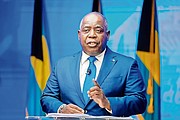Davis calls on UN to ‘step up’ on human trafficking
 By KHRISNA RUSSELL
By KHRISNA RUSSELL
Tribune Chief Reporter
AS he spoke of his administration's plans to fortify the country's borders in a bid to stave off increased migrant crossings, Prime Minister Philip “Brave” Davis revealed that The Bahamas opted not to sign a declaration that suggested nations host undocumented people last June.
While 20 countries signed the declaration, including: Argentina, Barbados, Chile, Jamaica, and the United States, Mr Davis said The Bahamas did not sign the agreement, suggesting limited resources was the reasoning behind the decision.
Mr Davis was also adamant in his national address last night that the United Nations needed to “step up” and direct its efforts to do more to stop human trafficking at the source.
“Last June, I attended the Summit of the Americas, where regional migration was one of the items on the agenda,” Mr Davis said last night. “During the Summit, countries were asked to sign a declaration on migration, which included language suggesting that countries support and host undocumented migrants. We did not sign this declaration.
“Twenty countries signed the declaration, including: Argentina, Barbados, Chile, Jamaica, and the United States. Let me repeat: The Bahamas is not a signatory to this agreement. I made it very clear to President Biden and to other leaders that our country does not have the resources to bear this burden. We need to devote Bahamian resources to solving Bahamian problems.”
Regarding measures to protect the nation's borders, Mr Davis said his administration planned to recruit hundreds of new Royal Bahamas Defence Force and Department of Immigration officers, invest $6m in new RBDF vessels and strengthen partnerships that amplify the country's ability to patrol Bahamian waters.
He also pointed to the establishment of a new maritime surveillance system and commissioning of a new coastal radar at the RBDF's Coral Harbour base.
Mr Davis said there were also plans to commission additional satellite radar systems in locations throughout The Bahamas, including Ragged Island, Andros, Eleuthera, and Exuma.
While the government seeks to bring added protections to police borders, the prime minister said there was no question that worsening instability in our region is a national security problem for The Bahamas.
“That is why we are increasing patrols of known passageways for human trafficking.
And that is why we are increasing the use of technology to detect undocumented vessels, and directing more manpower in our southern islands to intercept them before they venture deeper into our territory.
“These measures make an important difference – but our sea borders span thousands of miles – we need the United Nations to step up and do more to stop human smuggling at the source.
“A message must also be disseminated on the ground there, warning people not to make the dangerous journey – warning them not to risk their lives to be turned around again.
“To the extent that CARICOM can make headway on the ground where these very serious and tragic humanitarian crises are unfolding, that would only benefit our country. The Bahamas will be part of a multi-country regional effort to address the emergency there.
“But what we will not do, what we cannot do, is absorb the problems of other countries here.”
Last week Immigration Minister Keith Bell defended government's efforts to address the illegal immigration issue in the country, saying the number of people deported so far for the year alone is proof that officials are taking the matter seriously.
According to Mr Bell at the time, there were more than 2,400 foreign nationals repatriated so far for the year, the majority of whom are from Haiti.
Mr Bell was responding to calls from the Free National Movement for the government to take definite action to address the “immigration crisis”.
This “Eyes on Trafficking” story is reprinted from its original online location.
 ABOUT PBJ LEARNING
ABOUT PBJ LEARNING
PBJ Learning is a leading provider of online human trafficking training, focusing on awareness and prevention education. Their interactive Human Trafficking Essentials online course is used worldwide to educate professionals and individuals how to recognize human trafficking and how to respond to potential victims. Learn on any web browser (even your mobile phone) at any time.
More stories like this can be found in your PBJ Learning Knowledge Vault.
EYES ON TRAFFICKING
This “Eyes on Trafficking” story is reprinted from its original online location.
ABOUT PBJ LEARNING
PBJ Learning is a leading provider of online human trafficking training, focusing on awareness and prevention education. Their interactive Human Trafficking Essentials online course is used worldwide to educate professionals and individuals how to recognize human trafficking and how to respond to potential victims. Learn on any web browser (even your mobile phone) at any time.
More stories like this can be found in your PBJ Learning Knowledge Vault.
